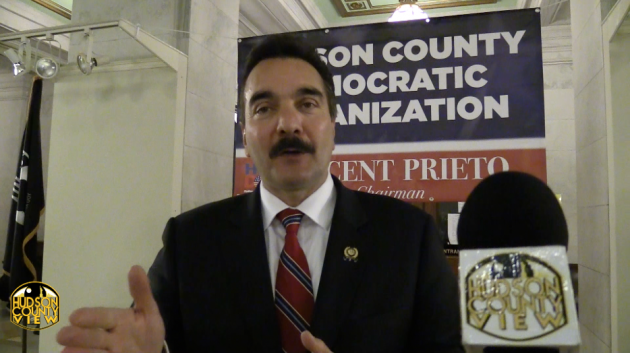The Jersey City Planning Board unanimously approved the development fee component of the right to counsel at last night’s meeting, setting up a city council vote for final approval.
By Daniel Ulloa/Hudson County View
The RTC campaign was launched last July by the Hudson County Democratic Socialists of America and cleared the council unanimously on first reading at their April 12th meeting.
Ward E Councilman James Solomon, one of three sponsors of the ordinance, called into the meeting to ask for the planning board’s support.
“It conforms with the Master Plan. We are facing an affordability crisis. We have seen rents increase by 10 percent in the last year … This ordinance can provide the funding to keep people in their homes,” he said.
Solomon continued that Jersey City is one of the most expensive cities in the country, further stating that thousands have been evicted in recent memory. He also emphasized this would have burden on taxpayers.
20 percent of the money allocated to the city’s Affordable Housing Trust Fund would be used to fund the RTC, with 80 percent earmarked for other miscellaneous affordable housing policies.
Solomon said some examples emergency rental assistance, affordable housing construction, and rehabilitating old buildings.
He noted the city would collect about $20 million a year in development revenues, leaving an annual RTC budget of about $4 million annually.
Supervising Planner Matt Ward explained when the fee would be incurred, including significant rehabilitation of buildings. He also explained that additions to buildings are exempt.
Board Chair Christopher Langston was concerned about accessory dwellings, to which Ward explained it meant units that were single dwellings detached from the principal structure.
“Is there anywhere that definition might differ?” Langston asked.
Ward said it was easy for them to define it specifically.
Still, Langston was also concerned that property owned by small landlords would need to be rebuilt after a possible disaster and could incur a fee.
Board attorney Santo Alampi said they intended to exempt owner-occupied dwellings that suffered a disaster. He noted they could explain their issues to the council via a transcript.
“These are just minor flags that go up for us,” Langston pointed out.
Community advocate Katie Brennan, who serves on the Waterfront Project board and is also a landlord, spoke in favor of the measure.
“The ordinance does nothing to hurt me. The people of Jersey City will have a fighting chance. Landlords like me have too much power. Almost all landlords come with representation, and almost no tenants do: It’s the right thing to do,” she stated.
Waterfront Project Executive Director Carol Sainthilaire also endorsed the full proposal.
“The city shouldn’t provide the representation themselves. There is too much conflict of interest there. We know the law, and we’re well-equipped to expand,” she asserted.
Sainthilaire said 90 percent of their cases are from Jersey City and that 50,000 eviction cases were filed last year in Hudson County.
“The homeless system in Jersey City cannot withstand a wave of evictions this large,” she declared. She also pointed out that two-family homes could be exempt from the measure.
“72 percent of Jersey City’s population is composed of renters. We … have some of the highest rent in the country. We have to make sure policies reflect those realities,” Ryan Spain asserted.
Jersey City Apartment Owners Association Executive Director Wendy Paul said that her organization retained attorney and planner Gordon Gemma for his input. He said this ordinance makes it difficult to define “developer.
“Every property owner … is now a developer, and you impact them with this ordinance,” he argued.
Gemma said minor landlords with small extra units would be adversely affected, which is contrary to the city’s Master Plan.
“Your Master Plan said these are the programs you should do to encourage affordable housing. I agree tenants should be appropriately represented,” he exclaimed, also emphasizing the exemption of two- and three-unit buildings.
“So in no place in the Master Plan does it encourage anything to prohibit affordable housing?” Langston asked.
Ward said the city Master Plan encouraged affordable housing policies.
“There’s very little market-driven affordable housing development. It’s through fees like these that we can create a balanced supply,” he added.
“This spending plan, it’s in a position to raise millions and millions of dollars. It also puts us in a position to raise four times that amount for the affordable housing trust,” Hudson County DSA activist Jake Ephros said.
“In talking to tenants here in Jersey City, we’re heard that people desire legal representation, and they also desire more affordable housing.”
Ephros also said the developer’s fee is modest.
On a related note, the imposed fees are either half a percent (0.5), one percent, or one-and-a-half (1.5) percent “of the equalized assessed value of the land and improvements for all new residential development.”
The lowest tier is for developers who obtain final site approval between July 9th, 2023 and June 30th, 2024, the middle tier is for developers who receive final site approval between July 1st, 2024 and June 30th, 2025, and the highest tier is for developers who receive final approve from July 1st, 2025 onward.
Attorney Will Fairhurst, a legal fellow for the Fair Share Housing Center, also came out in support of the measure.
“Developer fees are incredibly common practice here in New Jersey … The purpose of this ordinance is to complement exist housing policy in the city,” he said, indicating similar policies have been adopted in cities like Chicago, Hoboken, Union City, and New York City.
Additionally, Fairhurst pointed out that accessory dwelling units and similar structures would be on the fee exempt list.
Rev. Ritney Castine, of Jersey City Together said, reiterating the group’s endorsement of the plan.
He noted that while there could be some growing pains, “quality of life might be worth the investment.” Castine also expressed concerns about the displacement of Black and brown residents.
“This area is among the most expensive in the country. I feel that impact on a daily basis. It’s tough out there for folks,” he also said.
“This will change things. All our clients have issues around affordability,” Jersey City Anti-Violence Coalition Movement Executive Director Pamela Johnson explained, indicating she was tired of seeing low-income residents priced out.
“Staff has found this ordinance is consistent with the Master Plan,” Ward asserted.
“This ordinance is something we should have been doing. It’s going to be good for the city. I do agree it’s consistent with the Master Plan. I am happy to vote aye,” Vice Chair Dr. Orlando Gonzalez said.
Commissioners Vidya Gangadin, Vidya Desai, Steve Lipski, and Langston all concurred.
“I fundamentally believe societies have a moral obligation to help those in need. Those who are tenants, only about 3 percent of them can defend themselves in court. I vote wholeheartedly aye,” said Lipski
“I am going to say for the record I do think this is a great ordinance,” Langston declared.
Ultimately, the measure passed unanimously (5-0) and will now head back to the city council for second and final reading.









